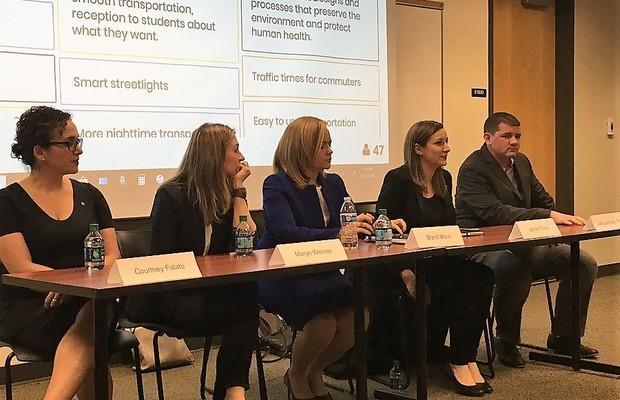By: Chris Booker
Students who want to learn more about The Ohio State University’s role as a smart campus in the heart of a smart city recently filled a classroom to hear from the leaders of the effort.
Smart Campus, a student organization partnering with the university’s Center for Automotive Research, hosted leaders from the city of Columbus, Smart Columbus, CAR, the university’s Technology Commercialization Office and the Transportation Research Center this month in Scott Laboratory.
“We have a campus that rivals in size some of the smaller cities in the nation. With that, we have the unique opportunity to operate in a microcosm where we can test and find solutions that can then be extended to cities around the nation,” said Cameron Luther, co-founder of Smart Campus.
The Smart Campus organization is working to help students from across the university find ways to collaborate with the Smart Columbus initiative and engage in campus projects tied to a connected campus.
In 2016, Columbus won the U.S. Department of Transportation’s Smart City Challenge, beating out 77 cities. The win secured $40 million in grants from the federal government and another $10 million from Vulcan Inc. Ohio State is the lead researcher on the project.
While the initiative, and the grant money tied to it, lasts for only a limited time, research at Ohio State will continue to make Columbus a smarter city.
“The reality is, here at Ohio State, because of the awesome faculty, staff and students, we’ve been really engaging in smart cities research the entire time depending on which definition we use,” said Courtney Falato, Smart Cites relationship director at Ohio State.
Falato said automotive research and connected devices are only part of what it means to be a smart city. She referred to a quote that put the research in context.
“So even though smart seems to be synonymous with technology, certainly it goes way beyond technology. What does it accomplish and how does it improve the lives of citizens?” Falato said.

Currently, Smart Columbus projects are focused on using technology to improve the Columbus community. One effort includes developing a common payment system for transportation so people across the economic spectrum can take advantage of public transportation, ride sharing or other services. Another is working to develop a way to provide more flexible and reliable transportation to expectant mothers using Medicaid-based services.
“(Columbus Mayor Andrew Ginther) believes that transportation and mobility is the great equalizer of the 21st century,” said Brandi Braun, deputy innovation officer for Columbus. “We want to ensure that we approach smart mobility and smart city technologies in a way where we are not widening the gap between Columbus’ haves and have-nots.”
Jordan Davis, director of Smart Columbus at the Columbus Partnership, told students that future advances in technology should lead to reduced congestion and a cleaner environment. It will also simplify mundane tasks like shopping for groceries or picking up dry cleaning.
“I think of mobility as a service in its simplest form. How can we use the sharing economy and how can we use technology to make mobility work for them,” Davis said.
Luther encouraged his peers to become active in the opportunities offered by the Smart Campus program.
“We’re right in the center of an amazing moment,” he said. “I really encourage all of you in the room that are here to take that opportunity by the horns.”

Smart Cities Talk shows the future role of a connected campus
Posted by
Jimmy_Lecar
7 years Ago
7th March 2018
Shares
Tags:
Smart Mobility
What’s your reaction?
Shares
Jimmy_Lecar














